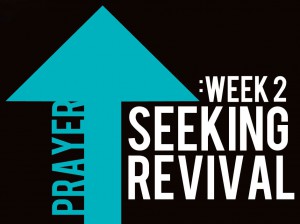Click
here for more on Seeking Revival .
Prayer is connected to humility
Last week we looked at humility. This week's look at prayer will overlap because prayer is part of the process of humbling oneself. 1 Peter 5:6-7 says
Humble yourselves, therefore, under the mighty hand of God so that at the proper time he may exalt you, casting all your anxieties on him, because he cares for you.
Peter says to humble yourself, casting your cares on God. This is like saying, bake cookies, turning your oven to 350. As turning on the oven is part of the cookie-baking process, casting anxieties on God is part o the humbling-yourself process.
But here's the kicker, prayer divorced from humility is invalid. God doesn't listen to prideful prayers. James 4:2-3 says You ask and do not receive, because you ask wrongly, to spend it on your passions.
The big two commands are to love God and other people. Prayers that reflect no regard for God or other people, but are only fueled by our own passion for ourselves (our comfort, our desires, our plans) are expressions of disobedience. This means that prayer can actually be an expression of disobedience. This happens when prayer comes from pride rather than humility.
We see this in Isaiah 58, when God defines true fasting as radically self-sacrificial service to other people:
Is this not the fast that I choose:
to loose the bonds of wickedness,
to undo the straps of the yoke,
to let the oppressed go free,
and to break every yoke?
Is it not to share your bread with the hungry
and bring the homeless poor into your house:
when you see the naked to cover him,
and not to hide yourself from your own flesh?
…Then you shall call, and the LORD will answer;
you shall cry, and he will say 'Here I am."
– Isaiah 58:6-7; 9a
There are prayers that God ignores. But there are prayers that he answers. He answers the prayers of the humble.
Some practical advice
As we seek revival, let's not lean on prayer lists or plans. Think of it as a conversational relationship with a real God. Maybe you've seen 'How to Converse with Your Spouse' lists, full of questions to ask each other to nurture conversational intimacy. They don't work because anything done by list is cold and mechanical. You grocery shop by list. You don't romance your spouse by list. Yet in your marriage you'll never find romance without conversation. And in our church we'll never find revival without conversation with God.
If you were to have a face-to-face conversation with someone very powerful, say President Obama, you would most likely let him take the lead. So it is with prayer. Let God take the lead with what he speaks to you from his word. Prayer lists often cause us to inadvertently talk to God like we talk at a fast food drive through, speaking our requests to him as clearly as we can, hoping he gets it right by the time we reach the window. Instead, let's approach prayer as response to God's communication to us. Let's think of prayer as response language, not initiating language.
If you flip your Bible to the middle, you'll find the book of Psalms. Right at the heart of the Bible, in the middle of all the action of epic history and passionate prophecy is this huge book of prayer. And these prayers follow no format or list. They are the day-to-day burstings of human hearts, bubbling with joy and misery, confidence and terror. They are the response of men who listened to God.
How do we know they listened to God before speaking? Psalm 1:1-3 introduces the book with a description of the blessed man who meditates on God's law day and night. In Psalm 4:4 and 63:6, David mentions that he meditates on the things of God in his bed at night. Psalm 19:7-14 he praises God's word. Psalm 119 is a 176 verse explosion of Scripture based prayer.
It's been said that Scripture is the soil and nutrients for vibrant prayers. Praying rooted in lists and methods soon dries up and becomes disciplined drudgery. But planted in God's word, prayer finds ample room to grow deep and healthy.
Conclusion
So, if we are seeking revival, we must humble ourselves and pray. If we're weak in prayer (which we are), our first step is to listen to God's word.
Discussion Starters
1. How would you define prayer?
2. How would you rate your prayer life on a scale of 1-10? Why?
a. How would you rate the prayer life of our church on a scale of 1-10? Why?
3. Read 1 Peter 5:6-7. Why is casting all your anxieties on him part of humbling ourselves? What does this casting look like?
4. Read James 4:2-3. What passions typically lead people to pray wrongly?
5. Read Isaiah 58:6-11. Brainstorm what it might look like for Dulins Grove’s light to break forth like the dawn, etc.? Dreaming big, what might God be able to do through our church in our community, nation, and world?
6. Read Psalm 19 together and pull out everything David says about God’s word.
a. What are some practical steps we can take to meditate on God’s word more as individuals and as a church? (See Psalm 1:1-3; 4:4; and Psalm 119 for more on meditation/prayer)
7. How can you serve one another in light of these truths?
8. How can your group pray for you this week?
Enjoyed this post? Share it with others:







